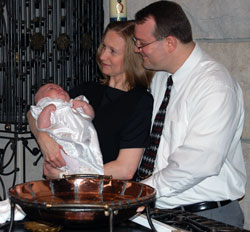Fall 2008 Marriage Supplement
God’s gifts of baptism and sacramental marriage bless families

Angela and Daniel Sarell hold their 8-week-old daughter, Allana Hope, during her baptism on June 1 at St. Luke the Evangelist Church in Indianapolis. Father Stephen Giannini, then pastor of St. Luke Parish, presided at the liturgy. (Submitted photo)
By Daniel Sarell (Special to The Criterion)
On the first day that the daffodils bloomed in our yard in Indianapolis, my wife, Angela, and I welcomed our first child, Allana, into our home of cats and into an extended family of mostly
non-Catholics.
For Allana’s recent baptism, we decided to read a letter to her so that she will always have a reminder of why we had her baptized and what responsibilities we assumed by that decision.
Secondarily, we wanted to explain to our non-Catholic relatives why we chose to have our baby baptized rather than wait for her to make that choice for herself when she is older.
Historically, infant baptism goes back to the ancient Church when whole families converted to Christianity at one time.
Throughout the ages, the Church has understood that baptism is necessary for one’s salvation, such that some theologians once hypothesized that unbaptized infants who died went to “limbo.”
However, the Holy See’s International Theological Commission clarified in 2007 that we commend all souls to God’s mercy, particularly those of unbaptized infants, and it is with confidence in that mercy that the concept of limbo—which was never solemnly defined by the Church’s magisterium—simply does not reflect the faith of the Church.
Despite the recent renunciation of limbo, the Church has always believed that baptism is necessary for salvation because salvation comes from Christ the Redeemer, who restores humanity from Original Sin, which baptism washes away.
By having our infant daughter baptized, we as her parents—filled with the confidence of hope—ask God to save and inspire her, to include her among the saints, and to join her to Christ’s paschal mystery—yes, even to his crucifixion.
If you saw a woman walking toward a rocky cliff-face—toward certain death—would you calmly try to make her understand the consequences before you intervene? No, you would yell and scream and make every effort to physically stop her from plunging to her death.
Baptism is like that. We don’t necessarily have to rationally understand how God transforms us and calls us to live in order to become one with Christ and his Church. Discipleship is a process of becoming, of discerning, of receiving
forgiveness and of growing into spiritual maturity by grateful cooperation with grace.
As a baptized infant, Allana is a member of the Catholic Church and counted among Christ’s disciples. We would no more wait to have her baptized than we would wait for her to choose to be a member of our family.
Allana is the greatest gift that my wife and I could ever have received from God. She has challenged us to become better people and better spouses for each other, more responsible, attentive and giving. In her utter dependence on us, the concept of how we need each other as spouses is no longer abstract.
When Angela and I exchanged our wedding vows, we promised to be true to each other, and we promised to be open to children and to raise them in the Catholic faith.
So beyond our own desire for Allana to share with us our enthusiasm for our faith, we bring her forward for baptism because as her parents we were called, even compelled, by God to raise her in the faith and to afford her the lifelong opportunity to grow in her religion by sacramentally living—to be literally immersed—in the mystery of who Christ is: the Son of God, our Savior and Lord.
In our society today, we have traded in communal obligation to something greater than ourselves for self-serving individual choice. We have turned ourselves, and our society, inward rather than generously outward. This is the opposite of faith in God or Christ-like discipleship.
Beyond feeling obliged to have Allana baptized as our parental duty, Angela and I also seek to anchor Allana’s formative years in the grace of our marriage, another sacrament that will nourish Allana’s Christian discipleship.
And yet, all around us, we see the moorings of that marital anchor buffeting in the wild surf of the many assaults on marriage in our culture and in our legal system.
As Catholic parents, we view our marriage—a sacramental covenant rooted in nature itself—as a living testament to the love of God as Trinity, a divine community of total self-giving.
Our fidelity and reverence for marriage is the greatest gift we can offer our daughter as she grows up. Our faith-filled married love—imperfect as it may be—is the surest means by which she can learn to live lovingly by being attentive to the needs of others and knowing that there is a God, the giver of life and to whom we owe our gratitude and service for everything we enjoy. This might be a “taught” idea of love, but it will only ever be effective if it is demonstrated consistently.
How often can we answer the question, “What does Christian service look like?” by simply saying, “It looks like a marriage,” and effectively communicate our point? And yet, this is what God intended, the vision that Christ redeemed at the wedding feast of Cana.
Angela and I will be imperfect parents, and we are under no illusion that we have the perfect child. However, by our profession of faith in having Allana baptized, we are taking the first and best step we know to declare before God that we will strive toward righteousness as husband and wife, as Mom and Dad, and as baptized believers in Christ Jesus.
(Daniel Sarell is the director of the archdiocesan Office of Family Ministries.) †
